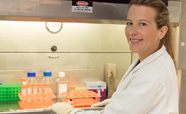 Research Fellow
Research Fellow
BBiomedSc(Hons), PhD (Otago)
Research interests
My research interests lie at the intersection of inflammation, ageing, cancer and epigenetics. By investigating the dynamic changes in epigenetic regulation associated with inflammation-induced carcinogenesis and ageing, my aim is to identify novel therapeutic targets and interventions for improving patient outcomes in cancer and age-related disorders.
I am particularly interested in how immune cell- and/or mitochondria-derived oxidants influence the enzymes involved in DNA methylation. We have seen that exposure to the oxidants hydrogen peroxide (H2O2) and glycine chloramine inactivate DNA methyltransferase (DNMT) activity via direct inhibition and the depletion of S-adenosyl methionine (SAM). The oxidation of DNMT led to site-specific changes in DNA methylation patterns and corresponding transcriptional perturbations in T-lymphoma cells. Many of these changes were associated with pathways important to cancer progression such as proliferation, differentiation, autophagy and apoptosis1–3.
My current work, generously funded by the Canterbury Medical Research Foundation, is exploring how bacterial lipopolysaccharide found in abundance in the gut of patients with colorectal cancer influences immune cell oxidant release and modify epigenetic patterns in this cancer.
I am also exploring how mitochondrial dysfunction influences the epigenetics and differentiation of haematopoietic stem cells with implications for ageing, haematological disease and cancer.
I am currently taking on highly motivated postgraduate students and/or medical students with a genuine interest in these fields.
1. Das, A. B., Seddon A.R. et al. Free Radic. Biol. Med. 170, 131–149 (2021)
2. Seddon, A. R. et al. Epigenetics and Chromatin 14, 1–16 (2021)
3. Seddon, A. R. et al. Hum. Mol. Genet. 00, 1–17 (2022)
Publications
Damiano, O. M., Stevens, A. J., Seddon, A. R., & Chatterjee, A. (2024). Altered DNA methylation patterns in colorectal cancer associated with immune cell oxidants. Proceedings of the 17th GeneMappers Conference. Retrieved from https://www.genemappersconference.org Conference Contribution - Published proceedings: Abstract
Stevens, A., Seddon, A., Hampton, M., & Andrew, D. (2024). Oxidative stress induced changes in DNA methylation. Proceedings of the 17th GeneMappers Conference. Retrieved from https://www.genemappersconference.org Conference Contribution - Published proceedings: Abstract
Seddon, A. R., Damiano, O., Hampton, M. B., & Stevens, A. J. (2024). Widespread genomic de novo DNA methylation occurs following CD8+ T cell activation and proliferation. Epigenetics, 19(1), 2367385. doi: 10.1080/15592294.2024.2367385 Journal - Research Article
Seddon, A., Das, A., Hampton, M., & Stevens, A. (2024). Understanding how immune oxidants can drive epigenetic change. European Journal of Human Genetics, 32(Suppl. 1), (pp. 720). doi: 10.1038/s41431-023-01482-x Conference Contribution - Published proceedings: Abstract
Helem, S., Pace, P., Seddon, A., Selwood, A., & Hampton, M. (2023). The anti-proliferative properties of the marine derived bioactive compound portimine. Proceedings of the New Zealand Society for Biochemistry and Molecular Biology (NZSBMB) 50th Anniversary Conference. Retrieved from https://www.nzsbmb.org/conference Conference Contribution - Published proceedings: Abstract
